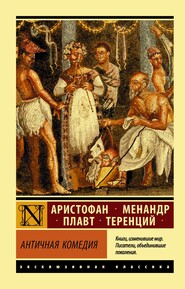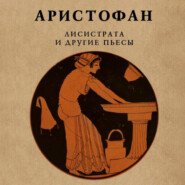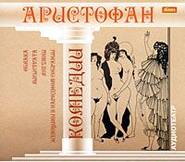По всем вопросам обращайтесь на: info@litportal.ru
(©) 2003-2024.
✖
The Eleven Comedies, Volume 1
Автор
Год написания книги
2018
Настройки чтения
Размер шрифта
Высота строк
Поля
431
An allusion to the disastrous Sicilian Expedition (415-413 B.C.), in which many thousands of Athenian citizens perished.
432
The dead were laid out at Athens before the house door.
433
An offering made to the Manes of the deceased on the third day after the funeral.
434
Hippias and Hipparchus, the two sons of Pisistratus, known as the Pisistratidae, became Tyrants of Athens upon their father's death in 527 B.C. In 514 the latter was assassinated by the conspirators, Harmodius and Aristogiton, who took the opportunity of the Panathenaic festival and concealed their daggers in myrtle wreaths. They were put to death, but four years later the surviving Tyrant Hippias was expelled, and the young and noble martyrs to liberty were ever after held in the highest honour by their fellow-citizens. Their statues stood in the Agora or Public Market-Square.
435
That is, the three obols paid for attendance as a Heliast at the High Court.
436
See above, under note 3 [433. Transcriber.].
437
The origin of the name was this: in ancient days a tame bear consecrated to Artemis, the huntress goddess, it seems, devoured a young girl, whose brothers killed the offender. Artemis was angered and sent a terrible pestilence upon the city, which only ceased when, by direction of the oracle, a company of maidens was dedicated to the deity, to act the part of she-bears in the festivities held annually in her honour at the Brauronia, her festival so named from the deme of Brauron in Attica.
438
The Basket-Bearers, Canephoroi, at Athens were the maidens who, clad in flowing robes, carried in baskets on their heads the sacred implements and paraphernalia in procession at the celebrations in honour of Demeter, Dionysus and Athené.
439
A treasure formed by voluntary contributions at the time of the Persian Wars; by Aristophanes' day it had all been dissipated, through the influence of successive demagogues, in distributions and gifts to the public under various pretexts.
440
A town and fortress of Southern Attica, in the neighbourhood of Marathon, occupied by the Alcmaeonidae—the noble family or clan at Athens banished from the city in 595 B.C., restored 560, but again expelled by Pisistratus—in the course of their contest with that Tyrant. Returning to Athens on the death of Hippias (510 B.C.), they united with the democracy, and the then head of the family, Cleisthenes, gave a new constitution to the city.
441
Queen of Halicarnassus, in Caria; an ally of the Persian King Xerxes in his invasion of Greece; she fought gallantly at the battle of Salamis.
442
A double entendre—with allusion to the posture in sexual intercourse known among the Greeks as [Greek: hippos], in Latin 'equus,' the horse, where the woman mounts the man in reversal of the ordinary position.
443
Micon, a famous Athenian painter, decorated the walls of the Poecilé Stoa, or Painted Porch, at Athens with a series of frescoes representing the battles of the Amazons with Theseus and the Athenians.
444
To avenge itself on the eagle, the beetle threw the former's eggs out of the nest and broke them. See the Fables of Aesop.
445
Keeper of a house of ill fame apparently.
446
"As chaste as Melanion" was a Greek proverb. Who Melanion was is unknown.
447
Myronides and Phormio were famous Athenian generals. The former was celebrated for his conquest of all Boeotia, except Thebes, in 458 B.C.; the latter, with a fleet of twenty triremes, equipped at his own cost, defeated a Lacedaemonian fleet of forty-seven sail, in 429.
448
Timon, the misanthrope; he was an Athenian and a contemporary of Aristophanes. Disgusted by the ingratitude of his fellow-citizens and sickened with repeated disappointments, he retired altogether from society, admitting no one, it is said, to his intimacy except the brilliant young statesman Alcibiades.
449
A spring so named within the precincts of the Acropolis.
450
The comic poets delighted in introducing Heracles (Hercules) on the stage as an insatiable glutton, whom the other characters were for ever tantalizing by promising toothsome dishes and then making him wait indefinitely for their arrival.
451
The Rhodian perfumes and unguents were less esteemed than the Syrian.
452
'Dog-fox,' nickname of a certain notorious Philostratus, keeper of an Athenian brothel of note in Aristophanes' day.
453
The god of gardens—and of lubricity; represented by a grotesque figure with an enormous penis.
454
A staff in use among the Lacedaemonians for writing cipher despatches. A strip of leather or paper was wound round the 'skytalé,' on which the required message was written lengthwise, so that when unrolled it became unintelligible; the recipient abroad had a staff of the same thickness and pattern, and so was enabled by rewinding the document to decipher the words.
455
A city of Achaia, the acquisition of which had long been an object of Lacedaemonian ambition. To make the joke intelligible here, we must suppose Pellené was also the name of some notorious courtesan of the day.











